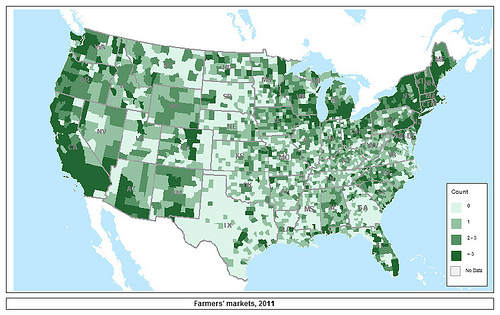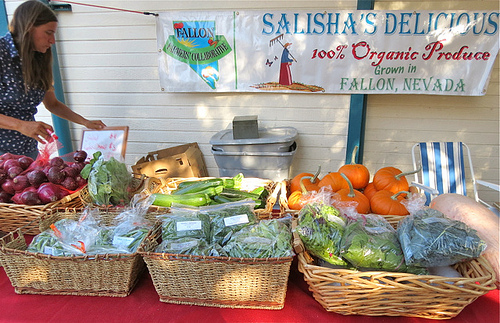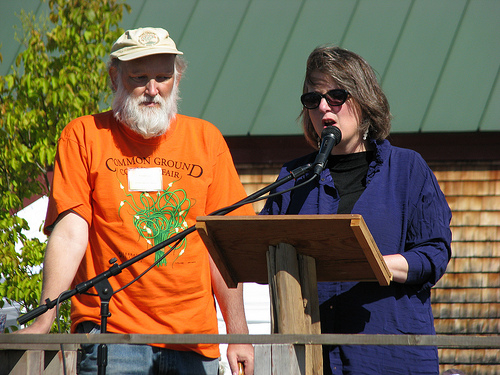Did you know Feb. 24 through March 2 is Bird Health Awareness Week? USDA’s Animal Plant Health and Inspection Service (APHIS) invites you to celebrate by joining poultry experts on a webinar called, “Growing Chicks Into Healthy Chickens: Getting Ready for Spring,” to be held on Thursday, Feb. 28 at 2 p.m. This webinar is hosted by the Chicken Whisperer, an Extension veterinarian and an APHIS veterinarian. Registration is required and details are here.
The Chicken Whisperer raises backyard birds in rural Georgia. He started years ago with a few hens and ducks, and this year is starting a new flock of 40 birds at his new home. Andy Schneider (the Chicken Whisperer’s real name), has helped countless bird lovers with their own flocks, has a radio show about backyard bird care, and runs the Atlanta Backyard Poultry MeetUp group which has over 1,600 members. Read more »
Three years ago this fall, Secretary Vilsack and I launched the Know Your Farmer, Know Your Food initiative (KYF2). Since then, we’ve seen interest and participation in local and regional food systems grow beyond anything we expected: whether I’m meeting with buffalo ranchers from the Great Plains or with members of the U.S. Conference of Mayors, I hear about efforts to connect producers and consumers locally and interest in how USDA can help.
In meetings of the White House Rural Council, which has representatives from across the federal government, regional food systems have been a key part of discussions. Read more »
Tags: CDC, Community-Supported Agriculture, Economic Development Administration, EPA, Farmers Markets, FMPP, HHS, HUD, Kathleen Merrigan, KYF2, KYF2 Compass, Pennsylvania, Philadelphia, Tom Vilsack, U.S. Conference of Mayors, White House Rural Council
 Food and Nutrition
Food and Nutrition
In an historic Cedar Rapids, Iowa, neighborhood devastated by floods in 2008, Secretary Tom Vilsack joined local leaders Saturday, October 27 for the dedication of a year-round local foods market. He called it a testament to neighbors and visionary leaders who saw a need for locally-produced foods, opportunities for entrepreneurs and a chance to rebuild local pride after the floods.
The NewBo City Market is located in Cedar Rapids’ New Bohemia district, home to generations of Czech and Slovak immigrants. Not far away is the Czech Village and the National Czech and Slovak Museum and Library.
Up and down the Cedar Rapids neighborhood brick buildings from the late 19th century are being restored. A new coffee shop and bookstore are housed across from the market in the national register-listed Czech-Slovak Protective Society (CSPS) building. A mile to the north, a new library and a convention center complex will open next year. Four years removed from the floods, there is no doubt about it, Cedar Rapids is back. Read more »

Number of Farmers Markets per County, 2011 (darkest areas have higher numbers). More than 7,800 farmers markets have sprung up across the United States, up from roughly 1,700 in 1994.
This post is part of the Science Tuesday feature series on the USDA blog. Check back each week as we showcase stories and news from USDA’s rich science and research profile.
Interest in local and regional food systems has expanded in recent years. The evidence is everywhere: from the number of farmers markets more than doubling nationwide since 2004, to the rising popularity of “community supported agriculture” (CSA) participation, to the increasingly common sight of restaurants and retail grocery outlets stocking and promoting meat and produce from local farmers and ranchers. This consumer trend has implications for the farms that supply these markets, firms across the retail supply chain, and policy makers at the federal, state and local levels that often promote local foods in various nutrition, food assistance and community development programs. Read more »

2012 Specialty Crop Block Grant will help expand existing efforts by the Fallon Small Farm Collaborative for create new market opportunities for Churchill County farmers, like the ones pictured above. Photo courtesy Fallon Farmers’ Collaborative
Earlier today, Secretary Vilsack announced the Specialty Crop Block Grant awards totaling $55 million dollars. These grants will fund over 748 initiatives across the United States and its territories, and help expand opportunities for local and regional farmers.
Specialty crops produced in the U.S. include fruits, vegetables, tree nuts, dried fruits, horticulture and nursery crops, and are often a key source of income for America’s farmers. Through this program, USDA’s Agricultural Marketing Service grants money to the state and territory for them to directly support projects creating new business opportunities, boosting efficiency and productivity, and improving food safety.
Read more »
Tags: Agroforestry, AMS, Grants, KYF2, KYF2 Compass, SCBG, Specialty Crop Block Grants, Specialty Crops, Wisconsin
 Food and Nutrition, Know Your Farmer, Know Your Food
Food and Nutrition, Know Your Farmer, Know Your Food

Deputy Secretary of Agriculture Kathleen Merrigan addresses a crowd during her keynote address. Standing next to Merrigan is Maine Organic Farmers and Gardeners Association Executive Director Russell Libby.
Deputy Secretary of Agriculture Kathleen Merrigan visited the Common Ground Fair on Sunday as a part of her visit to Maine. While at the fair, the Deputy Secretary met with leaders from USDA agencies as well as numerous Maine farmers and gardeners.
During her keynote address at the fair, Merrigan discussed organic farming as well as the Know Your Farmer, Know Your Food initiative. Through this initiative, USDA integrates programs and policies that stimulate food- and agriculturally-based community economic development; fosters new opportunities for farmers and ranchers; promotes locally and regionally produced and processed foods; cultivates healthy eating habits and educated, empowered consumers; expands access to affordable fresh and local food; and demonstrates the connection between food, agriculture, community and the environment. Read more »



